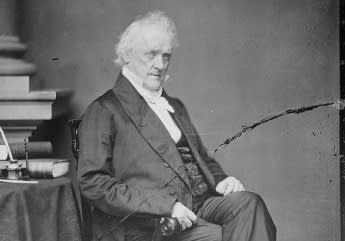Is there really a James Buchanan curse on Hillary Clinton?
Today is the birthday of one of the least-regarded Presidents, James Buchanan, and we look at some recent talk about the 15th President’s continuing influence on modern elections.
Last week, San Jose Mercury writer Josh Richman mentioned something called the “James Buchanan curse” in passing when he discussed Hillary Clinton’s chances of becoming the next President.
“Six American presidents had prior experience both as members of Congress and as cabinet secretaries; the most recent one, James Buchanan, left office in 1861,” Richman said. “Buchanan both was the last to succeed a fellow Democrat to the presidency by election, and was the last former U.S. Secretary of State to win the White House — a pair of 19th-century curses Clinton hopes to break.”
Richman noted that the five former Congress and Cabinet members were elected to the White House: Thomas Jefferson, James Madison, James Monroe, John Quincy Adams and Martin Van Buren.
In the Hall of Fame of American curses or jinxes, any alleged Buchanan curse would seem to be minor at best. In sports there was the Curse of the Bambino in Boston, where the beloved Red Sox went 86 years without a title after selling Babe Ruth’s contract to the hated Yankees. Or the Chicago Billy Goat curse for the Cubs, or the football Madden curse. Internationally, there was the King Tut curse.
And at one time, there was the purported death curse placed on Presidents chosen every 20 years since William Henry Harrison’s election in 1840. (Ronald Reagan and George W. Bush put an end to that jinx talk.)
Perhaps the bigger question here is the lack of success, or even interest, among Cabinet members in running for President.
After Buchanan in 1861, two former Cabinet members earned election to the White House: William Howard Taft and Herbert Hoover. Back in 1884, James Blaine, a former Secretary of State and congress member, lost to Grover Cleveland in the general election that November.
In two other cases, former Cabinet members came close to grabbing a major party nomination. In 1880, John Sherman, a former congressman and the current Treasury Secretary, lost out to James Garfield for the GOP nomination. In 1920 and 1924, William Gibbs McAdoo was a contender for the Democratic nomination.
The Pew Research Service looked at these trends last week and went back to 1796 to figure out which positions and jobs were held by presidential nominees prior to their election races. Not surprisingly, “President” was the most-popular prior job title, with 31 nominees as elected incumbents or vice presidents who assumed office. Next in line were governors (22) and senators (19) as nominees, with Cabinet members next with 14 nominations.
Pew says there hasn’t been a former Cabinet member nominee since Hoover in 1928, but there have been hopefuls such as Alexander Hague, Bill Richardson, Lamar Alexander and John Connally who made White House runs.
In 2012, Smithsonian Magazine also looked at the Buchanan jinx and found it lacking.
“It might be convenient to trace the jinx to James Buchanan,” said writer Andrea Stone. “But while Buchanan did fail to prevent the Civil War, political historians offer analysis that suggests he shouldn’t take the rap for sullying the prospects of his successors at State.”
Recent Constitution Daily History Stories
James Buchanan: Why is he considered America’s worst president?
10 odd facts about Abraham Lincoln’s assassination


